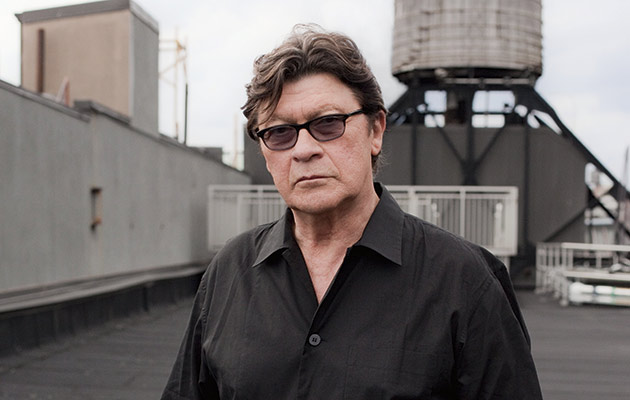BOB DYLAN & THE BAND
The Basement Tapes
(Columbia, 1975)
Burnt out, Dylan retreats to Woodstock. The Band join him and in 1967 they start making strange, tipsy carnival music largely for their own pleasure. The widely bootlegged results are officially released in 1975.
We never thought that the public was ever going to hear any of this. It was specifically a songwriting thing, Bob wanted to put down songs for other people to record. We’d lay down a song and he’d say, “Oh, that would be a good one for Ferlin Husky,” or, “Ah, I dunno, maybe Ramblin’ Jack Elliott might be able to get into that.” It was a random, fun thing. There was no pressure or seriousness, and that enabled a certain freedom. Everything you ever learned about recording technique was completely disqualified. This was a basement in Bob’s house with cement walls, a cement floor, and a big metal furnace in the middle. I was always interested in the sound and vibe of a record as much as the song itself, so I experimented quite a bit in the basement. There was something rebellious about it. A lot of it was trial and error, but the results had a quality to it that has stayed with me ever since: it’s about not looking for the obvious, trying to find the right mistake. The Basement Tapes sound so much like it’s on the edge of disaster it makes you hold your breath sometimes.
________________________
THE BAND
Music From Big Pink
(Capitol, 1968)
The Band’s first record, named after the house three of them shared in West Saugerties, features classic Robertson originals such as “The Weight” alongside new Dylan originals. The result is a foundation stone of roots rock.
When it was time for The Band to make a record I wanted this place up in Woodstock where we could do something interesting. The sound of that location ended up being the sound of the record. In a studio you felt like you were going into somebody else’s situation – there was a big clock on the wall and you were part of their world. That’s backwards, isn’t it? It was about flipping that over on its head: “It’s our music, our record, shouldn’t this be our world?” Now everybody does it, but back then there was nobody making records in their house. Oh my God, it was a happy time! We just played music, chased girls and had extraordinary life experiences. We were young and foolish and didn’t have a care in the world, but that communal thing only works at a certain age. People in college have the same kind of experiences, a bunch of friends living and growing together and working on your craft 24 hours a day. On my first solo album, I went to Dublin to do some recording with U2 and they had a set-up in Adam [Clayton’s] living room. I went in and they said, “Look familiar?”



